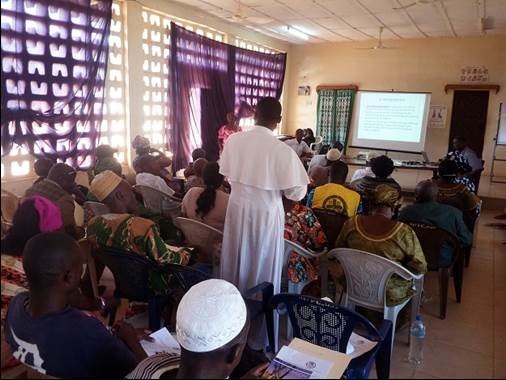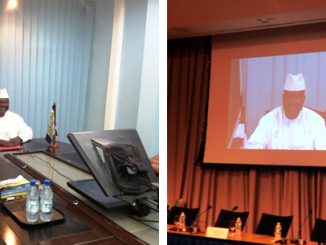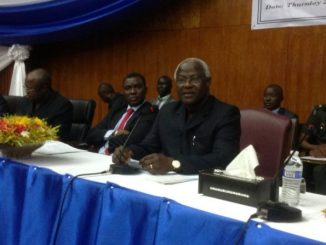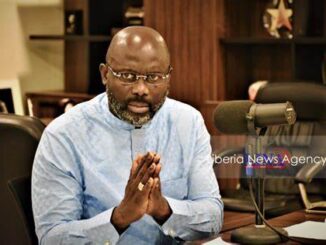
By Ahmed Sahid Nasralla (De Monk)
Religious leaders can serve as agents of change in their communities
Participants at a workshop on gender based violence (GBV) and the four gender Acts wanted to know whether rape could only be committed by men. They were in disagreement; some said women could not rape while others said women could induce rape; others said only a man’s sexual organ has the ability to erect while a woman’s cannot; some said only men feel the desire for sexual intercourse. Some others said culture and tradition prevent women from expressing their sexual desires. At the end of the lengthy exchanges the consensus was that women do get feelings too but they don’t rape.
The occasion was a two-day workshop on GBV and the four gender Acts organized by SEND Sierra Leone with funds from Amplify Change for community stakeholders in Kailahun on 3rd and 4th October, 2016. The participants, drawn from all the 14 chiefdoms in Kailahun District, included Paramount Chiefs, Religious leaders, Network women, women leaders, teachers, students, youth, district council officials, councilors, the police and the media.
At some point in the last two years GBV was rampant in the district of Kailahun, in Eastern Sierra Leone. In March 2015 the Family Support Unit in collaboration with the Regional Office of the Ministry of Social Welfare, Gender and Children Affairs in the District, transferred 10 cases of alleged rape against women to the court in Kenema for trial, but all 10 cases reportedly ended up being settled outside the court with each affected family allegedly accepting monetary compensation. Furthermore, the International Rescue Committee (IRC) reported that they recorded about 50 gender based violence (GBV) cases ranging from physical abuse, sexual abuse and rape to economic deprivation relating to Ebola.
According to the Kailahun Women in Governance Network (KWIGN), between January and September 2015, 37 cases of rape against women were registered by the Family Support Unit (FSU) in Kailahun District; only 25 of the alleged perpetrators were arrested and charged to Court.
In one instance a 14 year-old girl was gang-raped by three men in the Luawa Chiefdom in Konjo village. Two of the perpetrators ran away, while one was arrested in Bo and brought to the Kenema Police Station. In another incident in Upper Bambara Chiefdom in the Nyanyahun Village, a 10 year-old girl was raped by 4 men. All four men were arrested, charged and imprisoned at the correctional centre in Kailahun town. In the Nyanyahun village in the Luawa Chiefdom, a woman was beaten to death. Another woman was reported missing in Tangabu Village in the Kissi Teng Chiefdom, while in Sengema Gao also in the Luawa Chiefdom, another lady was found dead and naked. It reached to a point where women of the district, led by KWIGN, stormed the streets in black attire in a peaceful protest against GBV. The women further submitted a position paper to the authorities calling for a sitting Magistrate in Kailahun to address GBV cases.
Quite recently a police officer was arrested for allegedly raping a 13 year-old girl in Kailahun; he’s currently standing trial in Kenema.
At the national level the picture is gloomier. According to statistics released by the Family Support Unit of the Sierra Leone Police, a total of 11, 358 cases of child sexual abuse, domestic violence and rape against women and girls were recorded in 2014, shortly before the Ebola outbreak. In the last two years the cases have only increased, rather than decreased.
Part of the problem is the acute lack of knowledge on the four gender laws, suggested Thomas Juana, Project Officer for SEND Sierra Leone and one of the facilitators at the workshop. He believed that if people are aware of the consequences or penalties of GBV, it would serve as deterrent.
Between 2007 and 2012 the Sierra Leone Parliament enacted the four landmark gender Acts- the Domestic Violence Act 2007, Registration of Customary Marriages & Divorce Act 2007, Devolution of Estates Act 2007 and the Sexual Offences Act 2012. However, public education on these legislations is seriously limited even in the cities, not to talk of remote communities such as the chiefdoms in Kailahun district.
“From our engagement with community stakeholders, we realize that there’s a huge gap in terms of basic knowledge on these important laws offering protection for women and girls especially,” said Juana. “In these communities, people still hold on to reprehensible customs and traditions which suppress the freedom, dignity and development of women.”
The two days highly participatory training essentially focused on taking participants through the provisions of the four GBV Acts, the key terms, the offences and the penalties. The participants had abundant practical experiences to share from their respective communities.
Beyond the gender Acts, the workshop also looked at the Gender Model Family concept as way to help family members understand their individual roles and responsibilities and respect for one another. To introduce the participants to the novel concept put together by SEND Sierra Leone, they were shown a movie depicting the life of a local family. The film brought out the roles of every member of the family and participants appreciated the important role women play in the home. The facilitator then took participants through daily schedules and role profiles of women and men with a view to identify the similarities and differences in the types of activities men and women engage in on daily basis and identify the work load of men and women.
During the session, the facilitator asked participants of their views on who bear the brunt of work in the family between men and women. As usual the participants were divided; some said women bear the heavier burden, while others said it’s the men. To help the participants understand the triple roles of women (Productive, Reproductive and Community development) in their communities, the facilitator divided them into four groups, two groups of women and two groups of men. The activity was for each group to list down all the things they usually do from cock crow to bed time at night.
Furthermore, participants were asked to suggest activities men and women perform for the family and for self, in addition to identifying resources/facilities at the home and explaining between men and women who have access or control for each. After all the exercises, the participants all agreed that indeed women do more work than men in the home and in taking care of the family.
The presentation continued with the facilitator explaining the meaning of gender, the difference between sex and gender and other key concepts such as gender equity, gender equality, gender empowerment, gender relations, gender roles, gender issues and family resource management. Participants were further asked to suggest specific sex characteristics of men and women, and activities attributed to men and women based on gender.
“The outcome of the training workshop was that the participants realized that the 4 gender Acts do not only protect women, but men as well,” said Jeneba Combey, another facilitator and staff of SEND Sierra Leone. “Similarly in the Gender Model Family training, men realized that women are not lazy. Throughout the day women are busy working for the family; for example, taking care of the children, ensuring they are ready for school, cooking for the family, cleaning the home, fetching water among many other chores; whereas most of the work men do, apart from being the breadwinners, only benefit themselves- for example listening to radio, watching football, and passing time at Ataya Bases.”
The participants were challenged to plan together what they can do to change the negative thinking of men in their respective communities, so that women and men will live together in peace and dignity.
“The participants were deliberately chosen,” said Juana. “These are influential people in the community and they’ll serve as local champions against GBV. We expect them first to change their ways and to go back to their communities as change agents to pass on to others the knowledge they have gained during these two days.”
On the final day of the training, the participants were divided into chiefdom groups with each group coming up with an Action Plan that they would implement when they go back to their communities. They were asked what they wanted to be remembered for when they die, and they all wanted to be remembered for bringing change to their communities.
The take home message from the facilitators is that knowledge is power; admonishing participants to first change their own attitudes and then go back and teach other people in their churches, mosques, schools, meetings, homes and communities to help bring about the desired change.
Meanwhile, there was also a presentation on the Teachers Code of Conduct to give participants a fair knowledge of the role of teachers, their relationship with communities and how they too can help in teaching pupils to grow up respecting one another. Martin Mustapha Momoh, Supervisior of Schools, Ministry of Education, Science and Technology, in Luawa, Zone 1, Kailahun, highlighted the need for professional teachers to go through training to acquire the necessary qualification; the responsibility of teachers to their profession, students, colleague teachers, administration, parents, communities, use of school resources and overall work ethics. About 55% percent of the teachers in Kailahun district are volunteers, according to Momoh.
“We want to work with teachers, religious leaders and women groups to reach out to 36 schools in the district with education on the teachers’ codes of conduct and the four gender Acts,” said SEND Sierra Leone Country Director, Joseph Ayamga, adding that the exercise will lead to the formation of gender based clubs that will help promote and sustain behavioral change practices.



